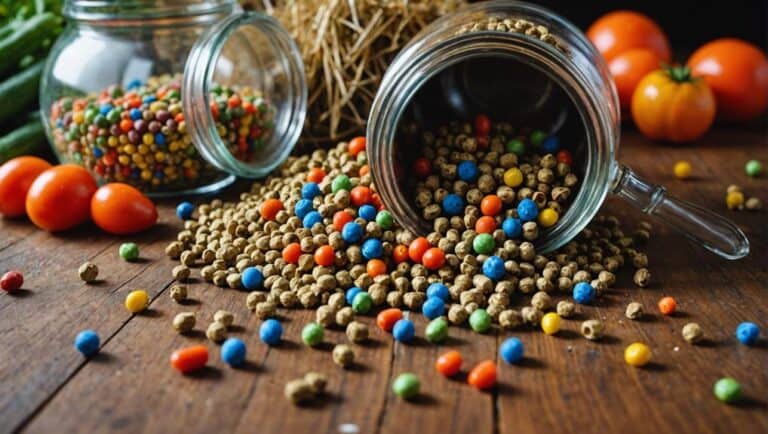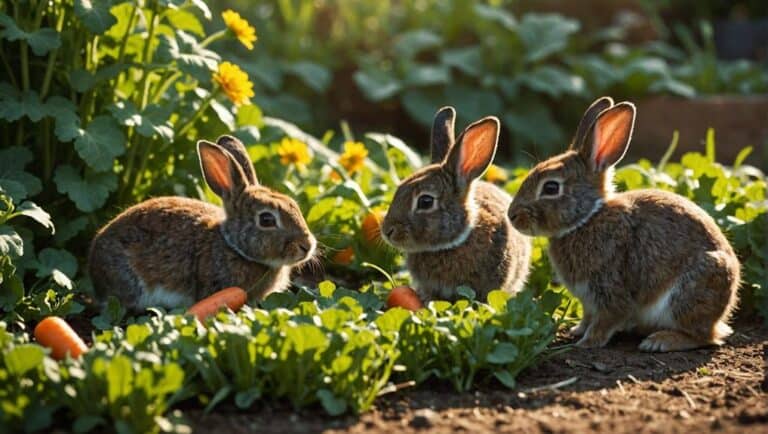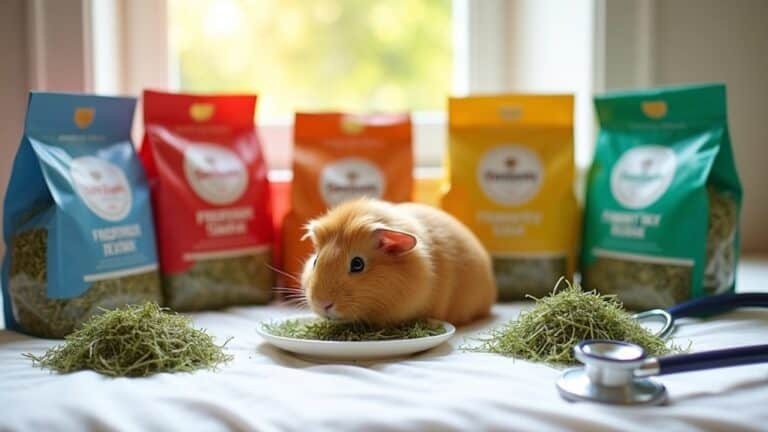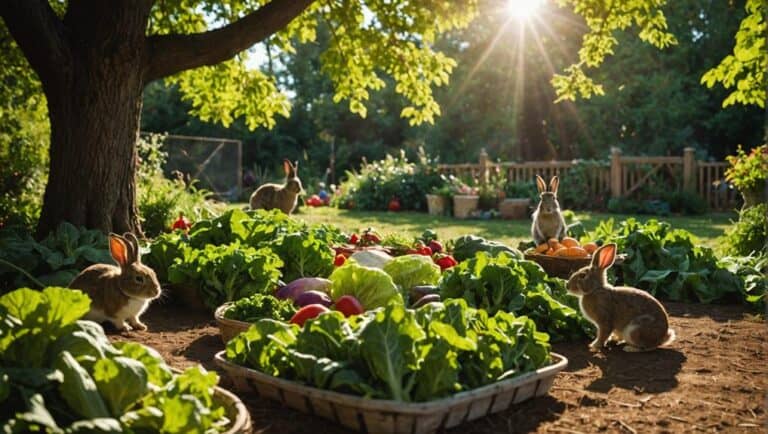Did you know that a 4-pound rabbit needs about 8 ounces of water each day to stay healthy? While it might seem straightforward, the actual amount can vary considerably based on factors like diet and activity level. Understanding how much water your rabbit truly needs is essential to preventing health issues like dehydration and kidney problems. So, how can you guarantee your rabbit is getting the right amount of hydration, and what signs should you look for to gauge their needs?
Contents
Importance of Fresh Water
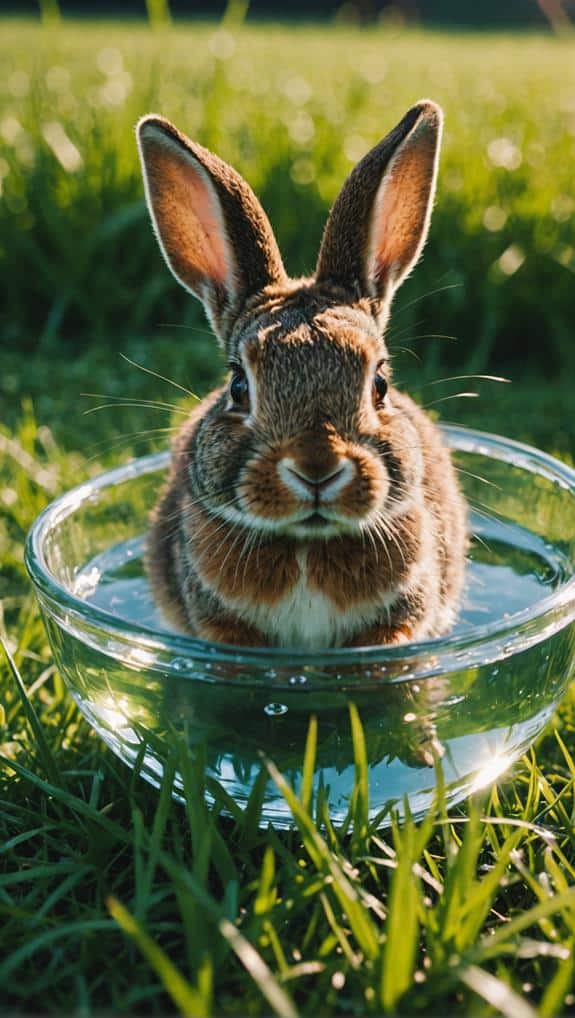
Fresh water is essential for rabbits, and its importance can't be overstated. Proper hydration greatly aids digestion, guaranteeing that your rabbit's gastrointestinal tract functions normally and helps prevent gut stasis, a potentially life-threatening condition.
When you secure adequate water consumption, you also promote cardiovascular health, which supports maximum heart performance and overall vigor. Additionally, access to fresh water complements a balanced diet that includes hay, pellets, and vegetables, contributing to overall well-being and bunny health.
Moreover, fresh water plays a critical role in preventing the formation of kidney and bladder stones. By maintaining healthy kidney function, it helps flush out excess calcium from your rabbit's body, greatly reducing the risk of urinary issues.
Additionally, water helps regulate your rabbit's body temperature, minimizing the risk of heatstroke during warm weather.
It's important to recognize the signs of inadequate water intake. Dehydration can manifest as lethargy or dry mucous membranes, both of which require immediate veterinary attention.
Daily Water Requirements
Understanding your rabbit's daily water requirements is essential for their health. Generally, rabbits need between 50-150 ml/kg of body weight, which means a typical 4 lb rabbit should consume about 8 ounces of water daily.
Proper hydration is crucial to prevent issues such as gastrointestinal stasis and urinary tract problems, making it imperative to guarantee they've access to fresh, clean water at all times.
Factors like size, activity level, and environmental conditions can greatly influence their hydration needs, so it's important to monitor their intake closely.
Recommended Daily Intake
Hydration is essential for maintaining your rabbit's health, and knowing their recommended daily water intake is important. Rabbits typically need between 50 to 150 ml of water per kg of body weight daily, translating to about 1 to 2 ounces per pound.
For instance, a typical 4 lb rabbit generally requires around 8 ounces of water each day. However, some rabbits might drink as much as 48 ounces based on their individual needs. A balanced diet rich in fiber not only supports hydration through food moisture content but also promotes overall health, which is critical for ideal water intake.
It's important to recognize that larger and more active rabbits, or those living in warmer environments, may have higher water intake requirements. You should assess your rabbit's hydration needs on a case-by-case basis, considering factors like diet and activity level.
Regularly monitoring your rabbit's water intake helps prevent dehydration; any sudden changes in their drinking behavior could signal potential health issues.
Factors Affecting Hydration
Several factors can influence your rabbit's daily water requirements, making it crucial to tailor their hydration needs accordingly.
The recommended daily intake for rabbits is between 50-150 mL per kilogram of body weight, roughly translating to 1-2 ounces per pound. Keep in mind that larger and more active rabbits, as well as those living in hotter climates, may need more water than less active rabbits in cooler environments.
To guarantee your rabbit drinks enough and stays hydrated, consider these factors:
- Age and Size: Younger rabbits and larger breeds typically require more water.
- Diet: A high-fiber diet with plenty of fresh greens can affect overall hydration needs; high-fiber diets may reduce the amount of water consumed.
- Health Status: Regularly monitor your rabbit's health; sudden changes in their water intake can signal potential health issues or dehydration.
Always provide water at all times, and be attentive to your rabbit's drinking habits.
Water Sources and Preferences
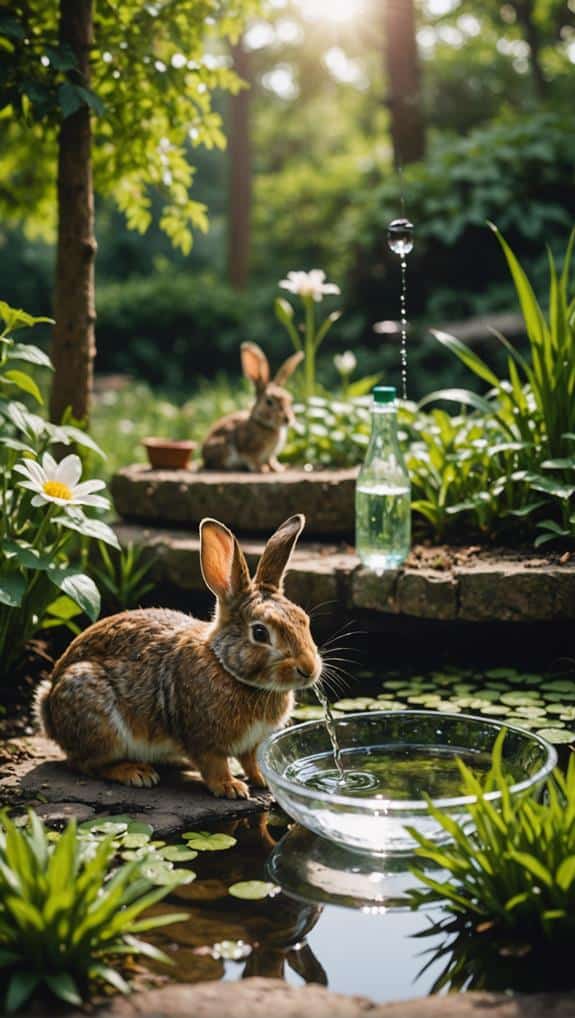
Rabbits typically show a clear preference for drinking from bowls rather than bottles, as bowls allow for easier access and mimic their natural drinking behavior. By providing both a water bowl and a water bottle, you can cater to different preferences, which may encourage higher water consumption.
Choose water bowls made from no-chew materials to prevent your rabbits from nibbling on them. Stability is important; a well-designed bowl should resist tipping to avoid spills and guarantee consistent access to water. Elevating the water bowl can also help keep the water cleaner by preventing contamination from bedding or litter.
Regularly offering fresh water and maintaining the cleanliness of both the water bowl and bottle is fundamental. Rabbits are more likely to drink when the taste and quality of their water are ideal.
In rabbit care, understanding these preferences and sources is significant to keeping your rabbits hydrated and healthy. Pay attention to their drinking habits, and adjust their water sources accordingly to promote well-being and comfort. Implement these strategies to create an environment that meets your rabbits' hydration needs effectively.
Signs of Dehydration
Recognizing the signs of dehydration in your rabbits is important for their health and well-being. Dehydration can lead to serious complications, including kidney stones, if not addressed promptly.
You should be vigilant for the following indicators:
- Lethargy and reduced activity levels
- Dry mucous membranes and a dull coat
- Decreased urination frequency or concentrated, dark urine
If your rabbit hasn't eaten or pooped in 12-24 hours, it's crucial to consult a veterinarian immediately.
Regular checks of moisture in your rabbit's mouth and skin elasticity can provide quick insights into their hydration status. For instance, skin that doesn't bounce back quickly when pinched may signal dehydration.
Ensuring your rabbits have access to fresh water every day is essential for maintaining their hydration and overall health.
A well-hydrated rabbit not only looks better but also functions at its best. By staying alert to these signs, you can prevent serious health issues and promote a happier, healthier life for your furry companions.
Best Practices for Water Provision
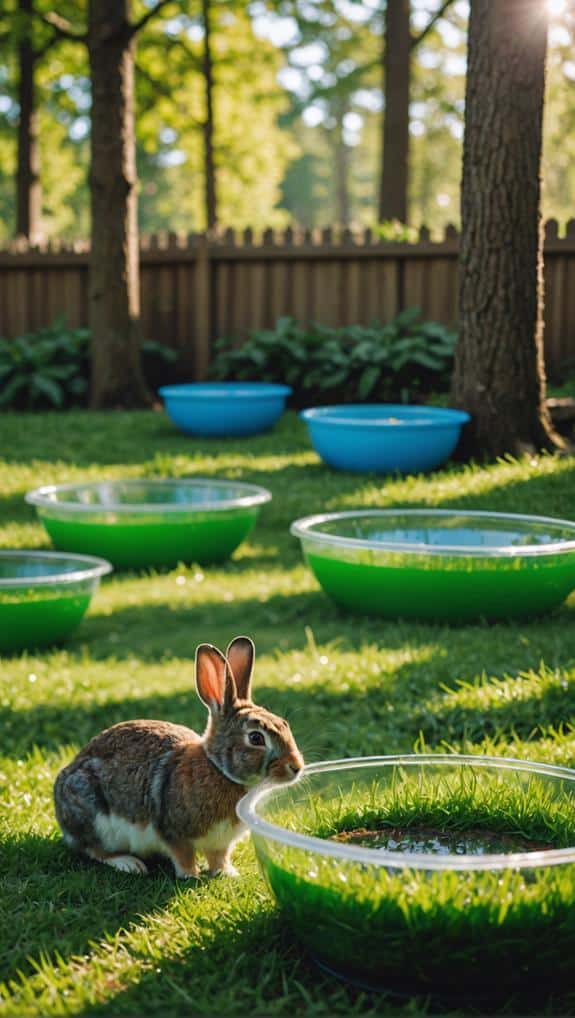
To guarantee your rabbits stay well-hydrated and healthy, it's crucial to provide fresh, clean water at all times.
The recommended intake for rabbits ranges from 50-150 ml/kg of body weight daily, highlighting the importance of hydration for their wellbeing.
Water bowls are ideal as rabbits generally prefer them over water bottles. Opt for wide-base bowls to prevent tipping and maintain stability.
Regularly clean both water bowls and bottles to avoid contamination, replenishing fresh water afterward.
Elevating water bowls on stands can further enhance cleanliness by preventing bedding contamination, which encourages rabbits to drink more.
Additionally, offering both water bowls and bottles in various locations caters to individual preferences, allowing your rabbits to access hydration easily.
Encouraging Hydration in Rabbits
Encouraging your rabbits to stay hydrated can greatly impact their overall health and wellbeing. To guarantee they're drinking enough water, consider implementing a few effective strategies.
Start by providing multiple fresh water sources, like bowls and bottles, to cater to their individual preferences and reduce competition. This way, your rabbits will have easier access to drink whenever they need.
You can also enhance hydration by incorporating hydrating greens into their diet. Fresh greens not only contribute to their overall water intake but also encourage them to drink from existing water sources.
Additionally, adding a small amount of fresh pineapple juice to the water can entice hesitant rabbits, especially if they're avoiding tap water due to its taste.
To promote regular drinking habits, maintain cleanliness by daily renewing and thoroughly cleaning the water containers. This enhances flavor and encourages your rabbits to drink more.
Regularly observing your rabbits' drinking behavior is essential; any changes can indicate potential dehydration and may require adjustments or veterinary consultation.
- Provide multiple fresh water sources
- Incorporate hydrating greens into their diet
- Maintain cleanliness of water containers
Monitoring Water Intake
You should regularly observe your rabbit's water intake to guarantee it meets their daily needs.
Look for signs of dehydration, such as decreased drinking or changes in behavior, which can indicate health issues.
Adjusting the water supply, like offering both bowls and bottles, can help cater to your rabbit's preferences and maintain ideal hydration.
Daily Water Observation
Monitoring a rabbit's daily water intake is essential for maintaining its health and well-being. To guarantee your rabbit is hydrated, aim for a daily water intake of 50-150 mL per kilogram of body weight. This equates to about 1-2 ounces per pound.
Regular daily water observation allows you to detect any potential health issues early on, as sudden changes in water consumption can indicate dehydration or illness.
Here are some key points to keep in mind:
- Assess individual needs: Consider your rabbit's size, age, and activity level, as these factors influence daily water requirements.
- Observe drinking habits: Regularly watch how much water your rabbit consumes to identify any abnormal behaviors.
- Guarantee clean water availability: Always provide fresh, clean water to encourage adequate intake.
Signs of Dehydration
Dehydration in rabbits can quickly escalate into a serious health concern, making it essential to recognize the signs early. One of the first indicators you might notice is lethargy; if your rabbit seems unusually tired or less active than normal, it's a red flag.
Dry mucous membranes, such as a dry nose or gums, are also vital signs of dehydration. In addition, keep an eye on your rabbit's drinking behavior. If you observe a sudden decrease in water intake, it warrants attention.
Monitoring rabbit urine is important; a consistent lack of urination or droppings for 12-24 hours can signal severe dehydration. Changes in urine color can also provide insights—darker urine may indicate that your rabbit isn't properly hydrated.
Moreover, if you notice sudden fluctuations in water consumption, this could point to underlying health issues like diabetes or kidney problems.
Physical signs, such as fur loss, can also accompany dehydration. By staying vigilant and observing these signs, you can take proactive steps to confirm your rabbit stays healthy and hydrated.
Always consult a veterinarian if you're concerned about your rabbit's water intake or overall health.
Adjusting Water Supply
Recognizing signs of dehydration is only the first step; ensuring your rabbit maintains a proper water supply is essential for their overall health.
Regularly monitor your rabbit’s water intake, aiming for a daily consumption of 50-150 mL per kilogram of body weight, roughly translating to 1-2 ounces per pound. Changes in this routine can indicate underlying health issues, so keep a close eye on any sudden increases or decreases. If you notice that your rabbit is consistently drinking less than the ideal water intake for rabbits, it may be a sign of dehydration or other health concerns. On the other hand, excessive drinking could suggest issues such as diabetes or kidney problems. Always consult with a veterinarian if you observe any significant changes in your rabbit’s drinking habits to ensure their well-being.
To effectively adjust your rabbit's water supply, consider the following:
- Routine Monitoring: Establish a consistent schedule for checking the water bottle, ensuring it's always filled with fresh water.
- Diet and Activity: Adjust water amounts based on your rabbit's diet and activity level. More active or larger rabbits will require increased hydration.
- Health Observations: Be vigilant about your rabbit's drinking habits. If you notice a decline in water intake or signs of dehydration, like lethargy or dry mucous membranes, consult a veterinarian immediately.
Veterinary Guidance on Hydration
Understanding your rabbit's hydration needs is critical for their overall health and well-being. Regular veterinary consultations play an essential role in evaluating your rabbit's specific hydration needs, which can vary due to individual health conditions and dietary intake.
It's important to monitor their water intake closely. Sudden changes, either increases or decreases, can indicate potential health issues like kidney problems or diabetes that require veterinary attention.
Routine health checks help you assess your rabbit's hydration status. Look for signs of dehydration, such as lethargy and dry mucous membranes, which may necessitate immediate intervention. Your vet can also provide guidance on managing dietary components, ensuring a balanced intake of hay, pellets, and greens that greatly influences daily water needs.
Encouraging ideal hydration through clean, fresh water is crucial. Discuss any changes in your rabbit's drinking behavior with your veterinarian, as this can enhance their health and well-being.
Final Thoughts
In summary, ensuring your rabbit has access to fresh water is like giving them a lifeline to health and happiness. By understanding their daily water requirements and recognizing signs of dehydration, you can play a significant role in their well-being. With proper monitoring and best practices in place, you'll not only keep your furry friend hydrated but also support their overall liveliness. Remember, a well-hydrated rabbit is a happy rabbit, so stay vigilant and proactive in their care!


